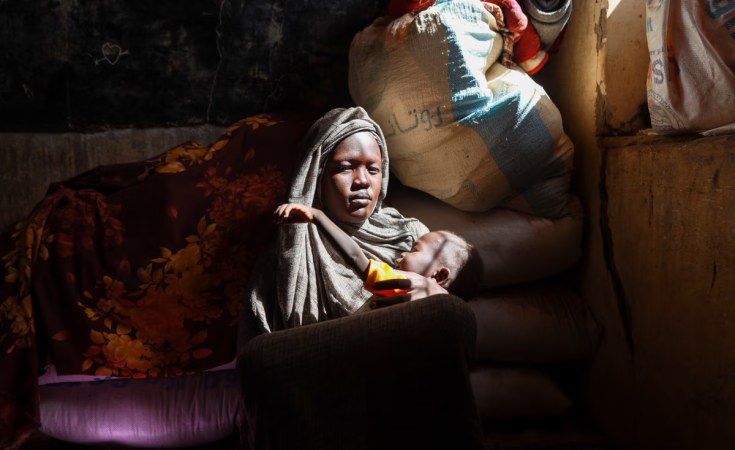A retrospective mortality survey carried out among Sudanese refugees in Chad by Epicentre, Médecins Sans Frontières' (MSF) medical research and epidemiology centre, documents the appalling scale of the wave of violence that swept through Sudan last June. Atrocities have continued in recent months in the region of El Geneina, the capital of West Darfur state, Sudan.
The study was carried out among Sudanese people now sheltering in three refugee camps, asking people who in their family have died during 2023, and how. In all three camps, the results from people indicate a significant increase in mortality in Sudan from the start of the conflict in April 2023 onwards. However, responses from refugees housed in the Ourang camp, who come mainly from El Geneina, indicated that their families have lost the greatest number of family members.
They told us that this wasn't our country and gave us two options: immediately leave for Chad or be killed. They took some men and I saw them shooting them in the streets, with no one to bury the corpses. H., a refugee who fled to Adré from El Geneina
The mortality rate increased 20-fold from April onwards, reaching 2.25 deaths per 10,000 people per day, with a peak in June; 83 per cent of those killed were men. Violence, particularly with firearms, was the cause of death in 82 per cent of cases. The majority of deaths took place in El Geneina, while a quarter occurred while people were fleeing to Chad. Nearly one man in 20 aged between 15 and 44 was reported missing during this period.
"The survey results corroborate the testimonies of some 1,500 Sudanese wounded treated by our teams in collaboration with the Chadian health authorities in the surgical unit at Adré hospital since last June," says Claire Nicolet, MSF head of emergency programmes in Chad. "The largest influx of wounded we experienced in Adré, with 858 war-wounded received between 15 and 17 June, corresponds to the peak mortality rate observed in the survey.
"Many of the wounded reported that Arab militiamen were targeting them because of their Masalit ethnicity and shooting at them in El Geneina," says Nicolet. "They told us that this violence then continued in the villages and checkpoints along the road to Chad, with men from the Masalit community being systematically targeted."
The accounts of refugees who have fled West Darfur over the last six months paint a picture of an unbearable spiral of violence, with looting, burning of homes, beatings, sexual violence, and massacres. Rooted in political, economic and land rivalries between the communities present on the territory, the ethnic dimension of the violence has taken a particularly extreme turn in the state's capital El Geneina, which is now virtually empty of the Masalit community that used to live there.
"They told us that this wasn't our country and gave us two options: immediately leave for Chad or be killed," says H., a refugee who fled to Adré from El Geneina. "They took some men and I saw them shooting them in the streets, with no one to bury the corpses."
"On the road to Chad, we were stopped at many checkpoints," says another patient treated by MSF in Adré. "They were asking us what tribe we were from. They were targeting Masalit people."
One of the most recent episodes of violence took place in November in Ardamatta, to the north-east of El Geneina. Hundreds of people have been reportedly killed, when the militias took control of the area which hosted a large camp for displaced people and a garrison of the Sudanese armed forces.
"There were 333 wounded, mainly people coming from Ardamatta with gunshot wounds, treated in Adré by MSF and Chadian Ministry of Health medical teams during the month of November", says Nicolet.
The largest influx of wounded we experienced in Adré, with 858 war-wounded received between 15 and 17 June, corresponds to the peak mortality rate observed in the survey. Claire Nicolet, MSF head of emergency programmes in Chad
The retrospective mortality study was carried out in August and September by MSF Epicentre teams in the Toumtouma, Arkoum and Ourang camps, which were home to 6,000, 44,000 and 25,000 people, respectively, at the time. A representative sample of 3,093 people (heads of households) was asked about the number and cause of deaths in their household in 2023, before and after the start of the conflict.
This makes it possible to determine a crude mortality rate and compare it over the two periods. This is one of the most widely used indicators for assessing the severity of a crisis among a given population, given that a rate equal to or greater than one death per 10,000 people per day characterises an emergency requiring an immediate response.
The war in Sudan has led to a major humanitarian crisis in eastern Chad, where almost half a million people have found refuge, alongside already vulnerable local communities and thousands of other Sudanese refugees who have been in the country for two decades.
Significant financial, logistical and human resources are still needed to step up the humanitarian response, particularly emergency food aid, in Adré and the surrounding camps. MSF teams continue to provide a wide range of medical care (including for paediatrics, maternal health, nutrition, trauma surgery, vaccinations, mental health) in Adré hospital and in various clinics and health centres, and to work to improve access to water, hygiene and sanitation services.
Epicentre is a Médecins Sans Frontières (MSF) satellite dedicated to epidemiology, medical research, innovation and training. Its experience and presence within MSF enable it to design and carry out projects in complex and often unstable situations, specific to humanitarian aid, to meet the health needs of populations and support MSF's action.


